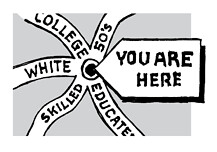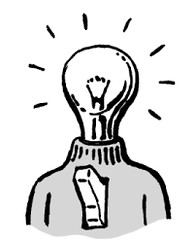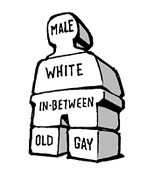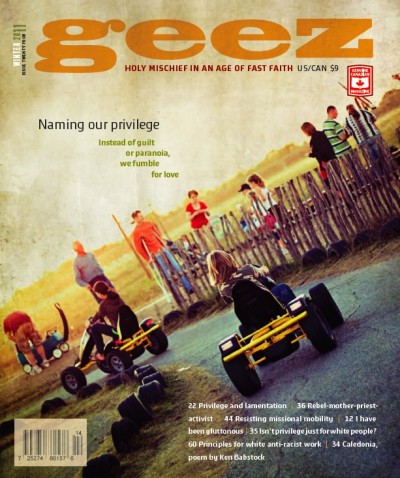Some Principles for White Anti-Racist Work
Those of us who are white sometimes try to change what we’re doing without changing our being, and we wonder why that doesn’t work so well.
Doing anti-racist work changes how and who we are as white folks, especially if we attend to what we know, and how we know it. Knowing is often the (unattended) transit point toward transformation. Here, then, are a few principles for white anti-racist being, knowing, and doing, distilled from reflections on the work of anti-racist communities.
1. Work from clearly identified social locations, stances and commitments.

You have a race, ethnicity, gender identity, economic class, sexual orientation, age, ability status, religion (or not), geographic location, education level. Know what difference these make to your experience of empowerment or disempowerment. Then figure out where you stand with that knowing: Who do you stand with? What are you standing for? Where are you committed to making life more abundantly possible?

2. Listen. And learn.
Fast from speaking; practice intentional followership.
3. Re-examine white histories, enculturations, worldviews.

See the good (white folks throughout history who’ve worked against racist oppression and white privilege), the bad (our history of exploitation, expropriation, expulsion, extermination, execution), and the ugly (minds stuck in the sands of the past). Examine the many facets of what it means to be white, and how we got this way.

4. Appreciate, don’t appropriate.
Appreciation explores and credits the authentic expression of others’ gifts, beauty, and wisdom. Appropriation takes the cultural and material resources of others and exploits them for one’s own gain.
5. Be responsive, responsible and open to transformation.

If you’re called, respond. We may not be responsible for history, but we must be responsible to it. There’s no way to decide in advance about every change: your stance is more important than being right, sure, or perfect. Be open.

6. Embed work in grassroots communities’ hopes and prayers.
The transformations that rehumanize you come through local, face-to-face relationships in your base community, where you work, dream, hope and pray together. The renewal of your soul is not only a spiritual challenge: it’s community work.

7. Ground work in just relationships.
Be accountable. Just relationships are accountable relationships: white people need to be accountable to people of colour and to anti-racist white people for our ways and our work. This means acknowledging both the veto power and the go power of our accountability partners: when they say no, we stop. When they say go, we go.
8. Focus your work on producing concrete changes.

Focus on change that makes a difference in the quality of people’s daily lives: your own, and those of people in your community, and the communities with which you are allied. ’Nuff said.
9. Think and work intersectionally, in power-aware ways.

No one is just white. We may also be male or female or genderqueer, rich or poor or in-between, gay or not so gay, of any and all ages and stages . . . and so on. It’s important to understand the variations of experience and empowerment (or disempowerment) that arise in our lives from the intersections of these characteristics, and how each presents a connection point for coalition and solidarity.

10. Embrace partiality.
This principle does double duty: first, embrace partiality in the sense of being partial to the well-being of people of colour. In looking at experiences, decisions, behaviours, work, resources, budgets, ask “Who benefits?” and if the answer is not people of colour, reconsider. Second, embrace partiality as a principled way of knowing: our knowing is always incomplete. As Otto Maduro points out in Mapas para la Fiesta (Maps for the Feast), our knowing and our knowledges are fragmentary, provisional and partisan, and should be considered conjectural. Nothing scary here; just a life-giving way of dealing with reality.
11. Work locally with global awareness.

Racism and white privilege are global issues, and we in North America have certainly exported some of our worst thinking and behaviours. Understand how racism and capitalism intertwine to justify ongoing economic and social oppressions, but don’t get stuck in analysis paralysis. Work locally, where you can have greatest impact, be accountable, transform, and be transformed.

12. Realign the white heart, mind and soul.
Can a heart, mind and soul be white? Can that heart, mind, and soul be occupied territory? Become intentional about your allegiances, conscious of what forms you, clear about your true source of worth. Reject being owned by things or systems. Freedom to love is an everyday project.
Tammerie Day is the author of Constructing Solidarity, theo-ethics for white people working against racism and white supremacy, as well as a chapter in the just-released Trouble the Water: A Christian Resource for the Work of Justice.



Start the Discussion